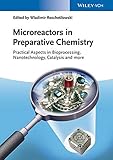Microreactors in preparative chemistry : practical aspects in bioprocessing, nanotechnology, catalysis and more / edited by Wladimir Reschetilowski.
Publisher: Weinheim, Germany : Wiley-VCH, [2013]Copyright date: ©2013Edition: First editionDescription: 1 online resource (xv, 335 pages) : illustrationsContent type:- text
- computer
- online resource
- 9783527652921
- 3527652922
- 9783527652891
- 3527652892
- 3527332820
- 9783527332823
- 660.2832 23
- TP159.M53 M53 2013eb
Edition statement from running title area.
Includes bibliographical references and index.
Microreactors in Preparative Chemistry: Practical Aspects in Bioprocessing, Nanotechnology, Catalysis and more; Contents; Preface; List of Contributors; 1 Principles of Microprocess Technology; 1.1 Introduction; 1.2 History; 1.3 Basic Characteristics; 1.3.1 Microfluidics and Micromixing; 1.3.2 Temperature and Pressure Control; 1.3.3 Safety and Ecological Impact; 1.4 Industrial Applications; 1.5 Concluding Remarks; References; 2 Effects of Microfluidics on Preparative Chemistry Processes; 2.1 Introduction; 2.2 Mixing; 2.3 Heat Management; 2.3.1 Heat Transfer in Continuous-Flow Devices.
2.3.2 Heat Control of Microchannel Reactors2.4 Mass Transfer and Chemical Reactions; 2.4.1 Fluid-Solid Catalytic Systems; 2.4.2 Fluid-Fluid Systems; 2.4.2.1 Flow Regimes; 2.4.2.2 Mass Transfer; 2.4.3 Three-Phase Systems; 2.4.3.1 Gas-Liquid-Solid Systems; 2.4.3.2 Gas-Liquid-Liquid Systems; 2.5 Flow Separation; 2.5.1 Geometrical Modifications; 2.5.2 Wettability-Based Flow Splitters; 2.5.3 Conventional Separator Adapted for Microstructured Reactors; 2.6 Numbering-Up Strategy; 2.7 Practical Exercise: Experimental Characterization of Mixing in Microstructured Reactors; References.
3 Modular Micro- and Millireactor Systems for Preparative Chemical Synthesis and Bioprocesses3.1 Introduction; 3.2 Modular Microreaction System; 3.3 Examples for Microreactor Applications; 3.3.1 Synthesis of Vitamin A Acetate; 3.3.2 Screening of Process Parameters for a Suzuki-Miyaura Reaction; 3.3.3 Scale-Up of Thermal Rearrangement of Furfuryl Alcohol; 3.3.4 Online Reaction Monitoring and Automation of Chemical Synthesis and Bioprocesses; 3.4 Laboratory Exercise: Suzuki Reaction in a Modular Microreactor Setup; References.
4 Potential of Lab-on-a-Chip: Synthesis, Separation, and Analysis of Biomolecules4.1 Introduction; 4.2 Learning from Nature: Analogies to Living Cells; 4.3 Microenzyme Reactors; 4.3.1 Enzyme Immobilization on the Microchannel Surface; 4.3.2 Enzyme Immobilization on Supports; 4.3.3 Modes of Operation; 4.3.4 Enzymatic Conversions; 4.3.5 Enzymatic Cleavage of Peptides; 4.3.6 Determination of Inhibitor Properties; 4.3.7 Cytotoxicity Assessment; 4.4 Microchip Electrophoresis; 4.4.1 Peptide Analysis; 4.4.2 Chiral Separation; 4.4.3 Coupling Biocatalysis and Analysis.
4.4.4 Determination of Amino Acids in Goods and Foods4.5 Microenzyme Membrane Reactor/Micromembrane Chromatography; 4.6 Nucleic Acid Analysis in Microchannels; 4.7 Saccharide Analyses in Microdevices; 4.8 Practical Exercise: Lipase-Catalyzed Esterification Reaction; References; 5 Bioprocessing in Microreactors; 5.1 Introduction; 5.2 Background; 5.2.1 Basic Elements of a Biosensor; 5.2.2 Different Sensing Methods; 5.2.3 The Effect of Reducing Dimensionality and Length Scales of Biosensors; 5.2.4 Biosensors Based on Field-Effect Transistors; 5.2.4.1 The Main Working Principle of FET Sensors.
This is the first book in the field to focus on these aspects, providing extremely valuable information unavailable elsewhere for anyone seeking the practical application of microreactor technology in preparative chemistry. The topics covered branch out in three different directions. To begin with, the knowledge necessary for the preparative chemistry concerning the influence of the so-called microeffects on the reaction procedure and on mass and heat transfer as well as the surface phenomena are provided in detail. Next, practical aspects of the synthesis of various basic chemicals and fi.
Print version record.
There are no comments on this title.

